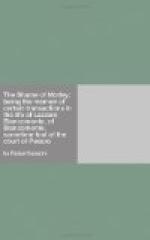“Returning from his bloody act, Ramiro ordered me to bed. I went, and as I passed Lampugnani’s room I saw the door standing wide. It was thus that I learnt what had befallen. I remembered his words concerning the hat and I remembered old suspicions of my own aroused by the thought of the potent wine which Ramiro had ordered me to see given to the couriers. I sped back to the gallery that overlooks the hall. Ramiro was absent, and I surmised at once that he was gone to the kitchen. Then was it that I thought of you and of what service you might render if things were indeed as I now more than suspected. Like an inspiration it came to me how I might prepare your way. I ran down to the hall, sweating in my terror that he should return ere I had performed the task I went on. From the buffet I drew a flagon of that same stout wine that Ramiro used upon his messengers. I ripped away the seal and crimson cord by which it is distinguished, and placing it on the table I removed the flagon I had set for him before I had first departed.
“Then I fled back to the gallery, and from the shadows I watched for his return. Soon he came, bearing a hat in his hand; and from that hat he took a letter, all as you have surmised. He read it, and I saw his face lighten with a fierce excitement. Then he helped himself freely to wine, and drank thirstily, for all that he was overladen with it. One of the qualities of this wine is that in quenching thirst it produces yet a greater. Ramiro drank again, then sat with the letter before him in the light of the single taper I had left burning. Presently he grew sleepy. He shook himself and drank again. Then again he sat conning his epistle, and thus I left him and came hither in quest of you.”
There followed a pause.
“Well?” I asked at length. “What is it you would have me do? Stab him as he sleeps?”
He shook his head. “That were too sweet and sudden a death for him. If it had been no more than a matter of that, my old arms would have lent me strength enough. But think you it would repay me for having seen my boy pinned by that monster’s pike to the burning logs?”
“What is it, then, you ask of me?”
“If that letter were indeed the treasonable document we account it; if its treason should be aimed at Cesare Borgia—it could scarce be aimed at another—would it not be a sweet thing to obtain possession of it?”
“Aye, but when he wakes to-morrow and finds it gone—what then? You know this Governor of Cesena well enough to be assured that he would ransack the castle, torture, rack, burn and flay us all until the missive were forthcoming.”
“That,” he groaned, “is what deterred me. If I had the means of getting the letter sent to Cesare Borgia, or of escaping with it myself from Cesena, I should not have hesitated. Cesare Borgia is lying at Faenza, and I could ride there in a day. But it would be impossible for me to leave the place before morning. I have duties to perform in the town, and I might get away whilst I am about them, but before then the letter will have been missed, and no one will be allowed to leave the citadel.”




